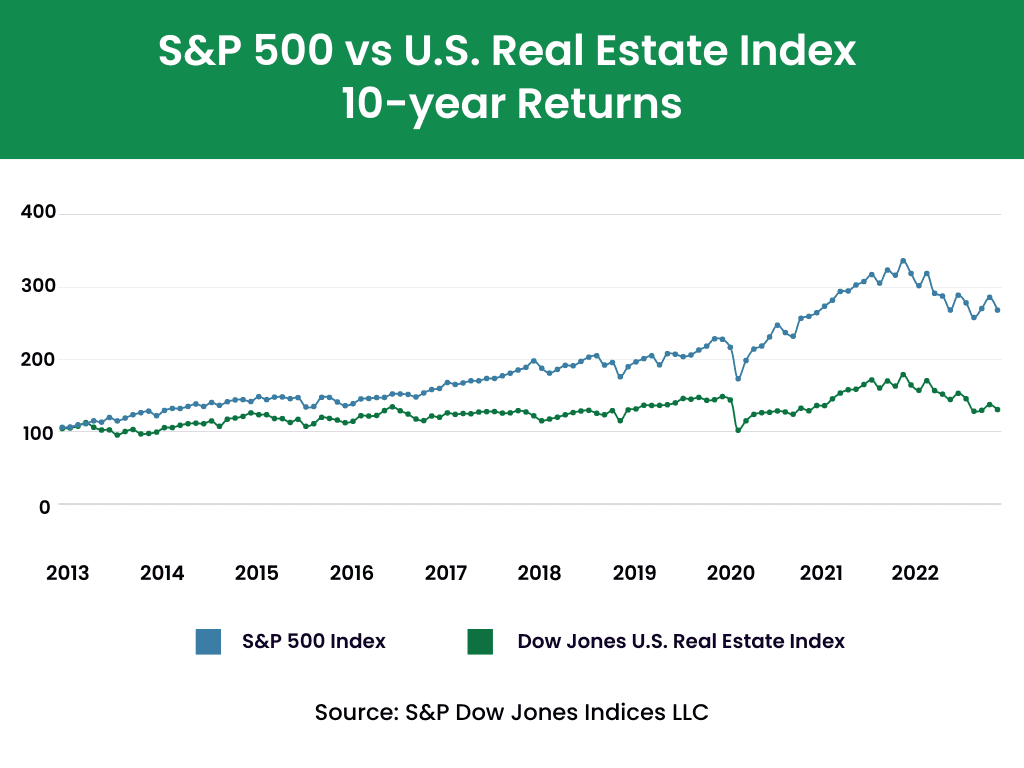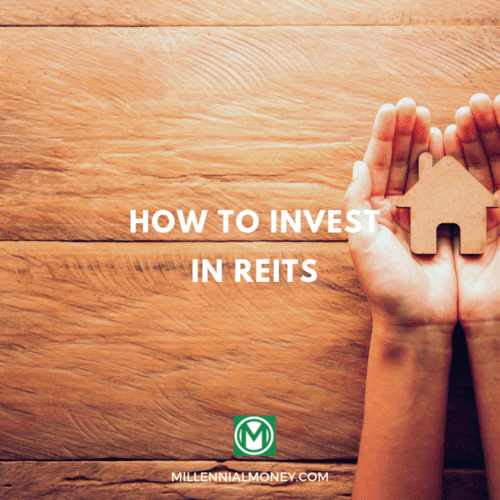You’re a new investor attempting to diversify your portfolio, maximize your returns, and minimize risk. As you explore your options, you are going to want to consider real estate vs index funds — two investments that can diversify your holdings and increase your chances of earning positive returns.
So, which is the better option? Index funds or real estate? Here’s a primer to get you up to speed.
Overview of Index Funds
An index fund is a portfolio of bonds and stocks that tracks the performance of a market index — if the market overall does well, you do well, so you don’t have to pick and choose the winners.
Examples of indexes include the Standard & Poor 500 (S&P 500), the Dow Jones Industrial Average (the Dow), and Nasdaq.
Index funds are typically passively invested, meaning they are automatically assembled and managed without human intervention. This makes index funds different from mutual funds, which are actively run by managers who attempt to beat market performance through various methods.
And just to be clear, having a fund actively managed is no guarantee of success — in fact, the majority of those underperform when fees are taken into consideration.
Pros of Index Funds
Passive Management
Passively managed funds tend to outperform actively managed funds over time. Active funds require direct human intervention, which means higher fees and doesn’t necessarily mean better returns.
Consistent Growth
Index funds can also provide steady, long-term growth for investors. Since they are diversified, index funds can protect investors from steep losses on specific stocks. If one or two accounts are in a portfolio tank, they are going to be naturally worked out of an index — meaning it’s only going to lead to a temporary loss in the fund.
Because of their consistency and ability to produce large gains slowly over time, index funds are an excellent option for long-term “set it and forget it” portfolios.
Low Fees
Index funds have much lower fees than non-index funds. And, since index funds don’t require portfolio managers, they tend to have lower expense ratios. When it comes to expense ratios, the lower the better.
An expense ratio refers to the amount of the fund that goes toward growing your investment, as opposed to paying for management and administration of the funds.
Cons of Index Funds
Minimum Investments
One of the downsides to investing in index funds is they often have a higher barrier of entry than individual stocks. For example, the Vanguard Dividend Growth Fund (VDIGX) comes with a minimum investment of $3,000, potentially putting this fund out of reach for investors who are operating on a budget.
That said, brokers like Vanguard typically offer index funds that don’t require minimum investments, too. For example, the Vanguard 500 ETF (VOO) has an expense ratio of just 0.03% and no minimum investment requirement.
Shop around to find the best index funds that align with your budgetary restrictions before opening a brokerage account and investing. Vanguard and Blackrock are optimal places to start your search.
Potentially High Fees
Watch out for index funds that have exorbitant expense ratios of 1.5% or higher. There’s really no reason for an index fund with high fees. And every dollar that goes into someone else’s pocket is a dollar that’s not building long-term wealth for you.
In addition, index funds can come with additional fees like annual charges and exit fees which occur when you trade or liquidate your funds. Always read a fund’s prospectus before purchasing it so that you have a clear understanding of what you’re getting involved with before you agree to anything.
Limited Flexibility
Index funds have less flexibility than managed funds because they follow strategies to stay aligned with various indexes.
This can become an issue for a declining index. When this happens, fund managers have little choice but to ride out the dip and wait for the fund to turn around. A rebound almost always occurs, but it can take time to occur.
When investing in index funds, investors need to be patient. Otherwise, it can be frustrating watching a fund underperform for an extended period of time. The best strategy with index funds is to set it and forget it. Focus on building a diversified portfolio and looking for ways to offset downturns.
Slow Growth
Don’t expect to get rich overnight with index funds. Even if you invest in a high-growth index fund, your money will be spread out over an array of companies. So if one of the companies in the index happens to double in value in a short period, the success will be diluted since it’s only a small part of the fund.
The bottom line here is that index funds are an excellent option for slow and steady investing who are looking to grow their net worth over years and decades.
Now that you have a better understanding of how index funds work, let’s take a deep dive into real estate.
Overview of Real Estate
Simply put, real estate is a piece of land or property with buildings or permanent structures attached to it.
Real estate investing can be an outstanding strategy to grow your net worth. As with any investment, there’s also risk involved, which you can mitigate by being savvy.
Pros of Investing in Real Estate
Diversification
Investing in real estate can be a great way to diversify your portfolio. However, if your only real estate investment is your home, then your real estate investments are not diversified. As the wise Robert Kiyosaki, author of Rich Dad Poor Dad, once said: “Your house is not an asset. Rather it is a liability.”
Passive Income
Investing in a rental property, REIT, or crowdfunded investment portfolio can produce income on a passive basis — meaning you can earn money without having to do much.
If you’ve been reading my blog for a while, you should already know that passive income is one of the top hacks for building wealth. That’s because time is one of your most precious resources. Look for as many passive income opportunities as you can.
Tax Benefits
Investing in real estate can also provide some excellent tax advantages for investors.
For example, you can deduct some expenses on a rental property like property tax, property insurance, mortgage insurance, advertising expenses, and property repairs. This can lower your taxable income so that you pay less when tax season rolls around.
Further deductions can be made if you invest in real estate as an entity and treat it like a true business investment. Additionally, you can use home depreciation to your advantage.
Cons of Investing in Real Estate
High Risk
Real estate investing can carry some heavy risks for investors, such as:
- Vacancy: There’s no guarantee that a rental property is going to bring in rental income, especially during down seasons. This can make it difficult to meet monthly mortgage payments.
- Damages: Investment properties are susceptible to risks like fires, floods, natural disasters, and irresponsible tenants.
- Bad investments: There is also the chance that a real estate investment can go belly-up, especially when investing in a low-demand real estate market area.
Ongoing Management
Unless you invest in a managed REIT or crowdfunded investment, or you pay a property management company to oversee operations, you can expect to put a considerable amount of resources into property and tenant management. This can be very stressful and time-consuming, making it hard for people with busy schedules.
Before entering into real estate, spend a few minutes thinking about your overall schedule and resources. Determine how much money and time you want to put in ahead of time.
For example, if you work full-time and have limited funds to allocate toward property management, you may want to stick with a managed fund. On the other hand, if you have a lot of time on your hands, along with sufficient knowledge of homeownership and repairs, you have more freedom to act as a full-time landlord.
High Expenses
Taking on multiple mortgages can add a considerable amount of financial stress for an investor — especially if you use your current home as collateral.
In addition to making monthly mortgage payments, there are a variety of other expenses to consider. Downpayments on investment properties typically have to be 20% or more. Closing costs, mortgage interest, monthly upkeep, property taxes, and insurance are just a few other expenses to consider.
Real Estate Returns vs. Index Funds Returns
It’s crucial to consider the return on investment of any asset before investing. One of the best ways to compare real estate and index fund investing is to look at their returns side by side.
Based on performance data, both real estate returns and index fund returns are promising. You can make a lot of money with both investments, but which one has the strongest performance?
To give you an idea of how real estate and index fund returns have stacked up historically, we compiled the monthly price return for the S&P 500 and the Dow Jones U.S.
Real Estate Index from 2013-2022 in the chart below:

While both indices have posted solid returns over the last decade, the S&P 500 wins out on price return, which is based strictly on capital gains and losses.
The annualized 10-year return for the S&P 500 was 10.43%, compared to a 3.03% return on the Dow Jones U.S. Real Estate Index.
When you look at total returns, factoring in distributions like dividends, the S&P 500 has higher returns. Its 10-year annualized return is 12.58%, compared to a 7.02% return on real estate.
But, keep in mind that this data doesn’t paint the whole picture, and several factors can impact returns.
First, let’s consider index funds. If you invest in an income fund, you can expect steady returns with dividends that provide short-term income. Meanwhile, growth funds, while riskier, can give you above-average returns in the long term.
When you’re a real estate investor, a lot of variables can impact your return, too. You can do anything from investing in a REIT to buying commercial real estate and leasing out office space. You could also rent out an apartment or vacation home, or flip properties to sell.
Returns can vary drastically depending on what you invest in, funding, property value, and location.
Frequently Asked Questions
Is real estate a good option for beginners?
It depends. Purchasing property can be like taking on a full-time job, which is very hard if you’re already working full-time and on a limited budget. If you have cold feet about entering into the real estate market, consider investing in a REIT or crowdfunding platform. This can be a much more cost-effective strategy that comes with a lower barrier to entry.
Should I invest in real estate and index funds at the same time?
Sure. Investing in real estate and index funds is a smart way to mix up your portfolio. You can even consider investing in real estate index funds, which can offer the best of both worlds.
Only you or your financial advisor can determine where you park your money. Educate yourself on your options, scour the market for the best deals, and try to get some guidance from the best experts you can find.
What are ETFs?
Exchange-traded funds (ETFs) are similar to index funds because they deal with baskets of securities instead of individual funds. However, ETFs are bought and sold throughout the day while index funds are bought and sold based on the price at the end of the trading day.
What is risk tolerance?
Risk tolerance is an investor’s ability to withstand losing money on a particular investment.
Risk tolerance is typically based on your age, income, and financial goals. For example, a young investor who has several decades to invest can afford to be more aggressive about where they allocate money. Young investors may choose to allocate more money into equities like stocks, which are more volatile.
On the other hand, older investors typically have less of an ability to absorb risks, so they might want to focus on more stable assets like bonds, for example. You definitely don’t want to put your nest egg on the line with a risky stock or investment strategy right when you’re going to need it.
What is an asset class?
An asset class is a group of investments with similar characteristics, making them bound by common regulations. Assets may be stocks or equities, bonds or fixed income, or cash equivalent accounts like money market accounts.
Are property managers necessary for real estate?
It largely depends on how much time and money you have. If you are a very busy person who owns a home, works full time, and has a family, taking on a second property can be very difficult. It can require a lot of time and effort and can add a significant financial burden.
If you have limited time or don’t live near your real estate investment, you may want to use a property management company to handle tasks like finding tenants, cleaning up after them, and performing the upkeep.
However, if you enjoy the hands-on work of being a landlord, and don’t mind handling repairs and maintenance yourself, you probably don’t need to hire a property manager.
Are individual stocks better than index funds?
Index funds provide slow, steady growth while individual stocks are much less predictable in nature. Invest in stocks if you are in a position to absorb risk and are unafraid to lose money quickly. Stocks can help you generate explosive gains, but they can also make you lose money at the same rate if you sell them in a panic. Don’t do that.
The best investors often have their funds in both stocks and index funds, and they definitely aren’t afraid to ride out stock market volatility.
Real Estate vs Index Funds: Which is Best for You?
It’s not a matter of looking at whether real estate or index funds are a better investment than the other. Both real estate and index funds can both provide steady, long-term gains, making them ideal for investors who have decades to grow their net worth.
Real estate and index funds both have a wide range of investment options and some can produce better returns than others. For example, a REIT can be a lower-risk option than buying a house outright. But you can’t live in a REIT, either.
As an investor, you should explore the market to find solutions that align with your personal and financial goals. Also, the sooner you can get your feet wet, the more time you will have to maximize your investments and get on the path to financial independence. Oftentimes, people start too late in life after their prime earning years have gone by.
Never stop learning and don’t be afraid to take the plunge. Soon enough you will be on your way to financial freedom.





No comments yet. Add your own